Sorena Sattari Expressed in an Interview with Khabar Online:
Culture building for ecosystem of entrepreneurship; the way to develop knowledge-based economy
Culture building for ecosystem of entrepreneurship; the way to develop knowledge-based economy
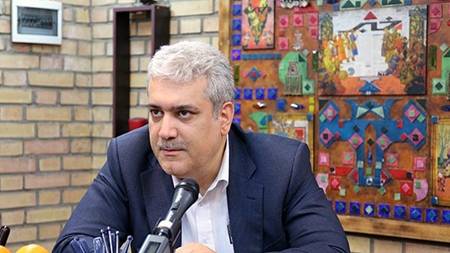
In this issue of Kafe Khabar, the vice president for science and technology affairs regarded the most important solution for saving the economy of the country to be the culture building of ecosystem of innovation and entrepreneurship by relying on creative educated youth.
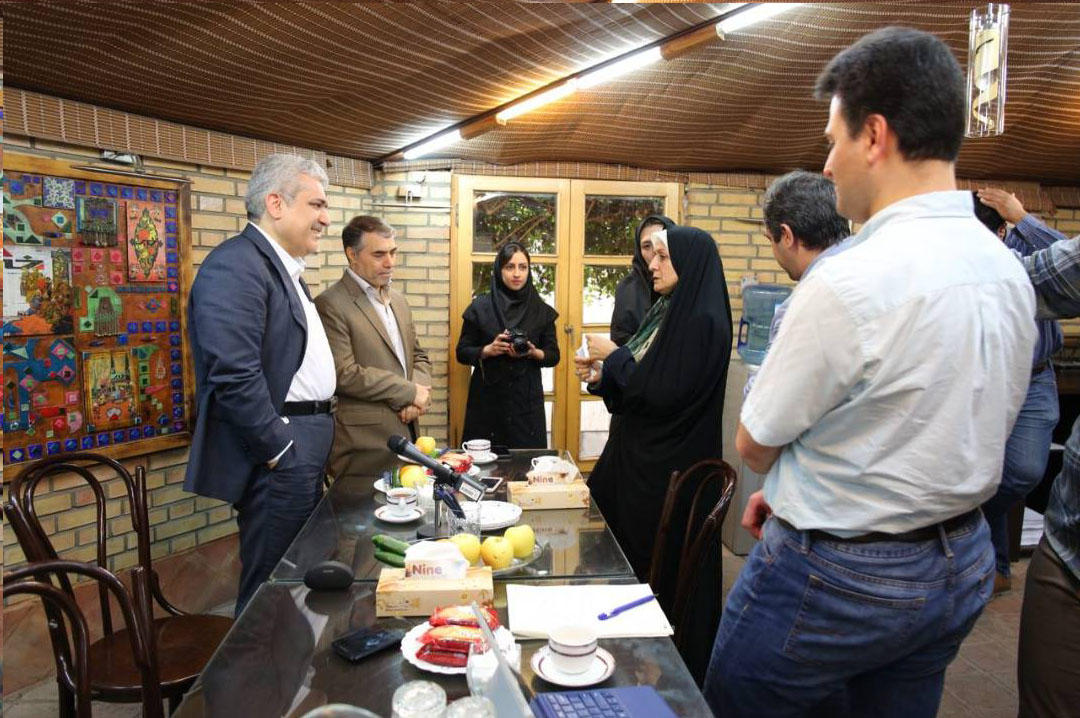
According to the public relations and information center of the Vice-Presidency for science and technology affairs, in addition to visiting Khabar Online Office, Sorena Sattari participate in Kafe Khabar and answered our questions and some of the questions raised by users of Khabar Online for about two hours. This interview is presented below:
In your autobiography, you have written that you were the top students at BSc level and had the opportunity to leave the country and study abroad. However, your father (brigadier general martyr Mansour Sattari, former general of Islamic Republic of Iran Air Force) opposed this decision. Therefore, you stayed in Iran and continued your education to after PhD in mechanical engineering in Sharif University of Industry (2001). Today, most of your sayings are related to economic models and your current priority is innovation and theory of Schumpeter. When there was no faculty of management and economy if Sharif University, and elite students would not be attracted to field of economy. The route taken by you was before the formation of this wave of interest by Dr. Mashayekhi and Nili. What happened to the economy of Iran? Have there been similar situations for those who entered universities the same year as you?
You see, elites generally are not attracted to fields of electricity and mechanics. I mean no disrespect to any field of study but this is a fact that elites of the world often go after law and economy fields. Sometimes, they say that a professor in Stanford University has claimed that the electricity students of Sharif University are the best in the world. This is mainly due to the fact that elites do not enter this field that much. The importance of these fields is their impact on the society. As engineers, we might be able to repair things, but the social mainstreaming has shifted toward other areas. The social mainstreaming occurs by law and economy, and I can claim that 60-70% of electricity students of Sharif University will turn to other fields in higher levels. Most of Sharif students change their field inside or outside the country. Even the current best students are those who have changed their field from engineering to human resources and to other universities (at higher levels), such as Alameh Tabatabaei. Without a doubt, this fields can change the course of the society and we must realize that lack of this process will lead to no positive change in the community. It should be mentioned that government money does not solve society and country problems only if specific mainstreaming is created. Government money must only be used to empower this current since government money often acts in contrast to these streams due to their public nature. We are naturally drawn to this area. During 2000-2006, I was working in an energy consumption optimization organization and was the CEO of the organization for a specific time. After that, I concluded that we failed for mainstreaming in the area of energy consumption optimization and culture building. For instance in the area of new energies, we equipped several buildings with solar energy. However, we visited a few years later and saw that all of them were destroyed. This was due to lack of proper culture building and that act was not the actual need of the region. We thought that this would be effective, which in fact was not.
Could you please elaborate on that? How could you achieve positive results? What was your responsibility?
Yes, you see, we have serious problems in government thinking. We have a fat and rented government due to our oil-based economy. In general, any country with economy based on underground resources has a rent economy. In this type of economy, being closer to the source of rent means gaining more benefits. Similarly, the concept of occupation means employment by government. In such systems, there is no innovation and idea since everything is managed by the government. We need to realize that if there needs to be a proper current, we should enter different fields. I move toward this issue due to my occupation. I received my PhD on energy and I am a faculty member of Sharif University of Industry. In the area of energy, we have performed various tasks but have never been able to take steps in this mainstreaming of the field. One of the causes of this shortcoming is low price of energy and lack of having economic projects. I believe that we can change this issue not just be restricting energy use but by bringing about other topics.
Integration of fields is something that is currently observed in the world. For instance, pharmacy students simultaneously pass management courses in some universities of America. This might be due to eliminating the same shortcoming you talked about, meaning the combination and mainstreaming of scientific fields together. How much of these processes must be performed in Iran and how much of their infrastructures have been provided to guide students toward this path?
We have huge problems in higher education system, which is again having a governmental attitude toward education. We are blindly training individuals for markets that we do not even exist or not. Then, we appoint a government person to evaluate this demand. This government expert expressed that students must learn what specific fields. A large defect in this regard is separation of medical sciences from engineering. There are few countries that have applied this distinguish, which has seriously damaged interdisciplinary sciences. In top universities of America, there is no such thing as “process engineering” in chemistry and if you talk about, it seems that you are talking about dinosaurs. The most prominent scientists working on biotechnology, genetics and stem cells have passed chemistry and basic sciences.
It is vice versa in Iran. We use biotechnology in medical faculties and a few engineering faculties. This applies to the area of economy as well, meaning that our universities must learn economy from humanities. However, the more successful graduates in the field of economy are those who have passed the engineering course. This difference and distinguishing of fields is significantly harmful in university entrance exam. However, what is more damaging is that the aspect is related to specifying the fields of study of individuals by the government. Over the past few year, I have concluded that the best way to modify the government structure is startups, meaning that we cannot modify many areas from inside the government but we can shape them from the outside. When this large number of startups have been formed in the area of biotechnology and some of them are among the largest companies in the area of medication or export, they force themselves on us saying that they are required in the community. These are currently happening in the country for the first time. In fact, this is the first time that the private sector forces itself on the education system. Until yesterday, they demanded a higher number of mechanical engineers since they were required by a specific ministry or government organization. This is also happening in the private sector. Over the past three years, demand for computer field has been on rise more than the electrical engineering field of Sharif University of Technology. This will change in the future, but a question is raised on whether this process has been formed by the government or the private sector. Today, individuals working outside of the government section determine the changes in this regard. We should not undermine the startups. Some people believe that startups only provide services but there are several startups on biotechnology. Many young individuals have established companies worth of million dollars in areas of biotechnology, medical equipment, nanotechnology and stem cells. However, service companies are important as well. If fact, technological startups cannot be shaped until there is no service startups. These startups exist to create the market. This is also observed in the world. No one would build UAVs if there were no Amazon since there would be no demand in this regard. The Google would not exist today and there would be no self-driving cars and artificial intelligence. All of the people think that this is easy. For instance, Digikala has currently 10 thousand suppliers but was it easy to reach this level? This is a technology. Everyone says that this is just a software, but it is not a simple software. Otherwise, many other people would build such a thing. The fact that the price of a product is the same in Tehran and a village in Chabahar is the exact replica of citizenship rights. On the other hand, Snap currently has 350 thousand drivers, and artificial intelligence used in this app is remarkable. All processes performed in Tap30 are based on artificial intelligence. The mentioned software are not simple and must be constantly developed and updated due to market competition. There are several individuals with PhD degrees working in the technical teams of these companies. A company like Alibaba is active in the area of tourism and sells about 150 thousand airplane tickets in a month. Look at its technical team to see how many of them have returned to Iran from abroad. Statistics of the past two and a half years have shown that more than one thousand individuals have returned to the country to work in service startups. The largest return platform of these individuals has been startups, and this is happening in the country for the first time. The revenues of these companies are significantly high as well. We previously thought that individuals would be recruited by universities with a normal salary and after passing several filters. But we can see that is not the case and the salaries of these individuals are higher. Therefore, our economy must be based on thinking if we want to return these people to the country.
Unfortunately, there is no mechanism in the government sector to attract individuals based on innovation. The main criterion for government occupation is academic degree. Nevertheless, the startups developed in the education area have changed all of our perspective toward this field. Startups working in the marketing area are changing the whole occupation attitude of the country. One of the companies that is active in the information technology field has recently hold a test, which was taken by high school students along with Olympiad students of Sharif. I saw that these individuals were invited to work in the companies without having the required academic degrees. This revolution is definitely not from inside the government system, whether in the higher education or education system of the nation.
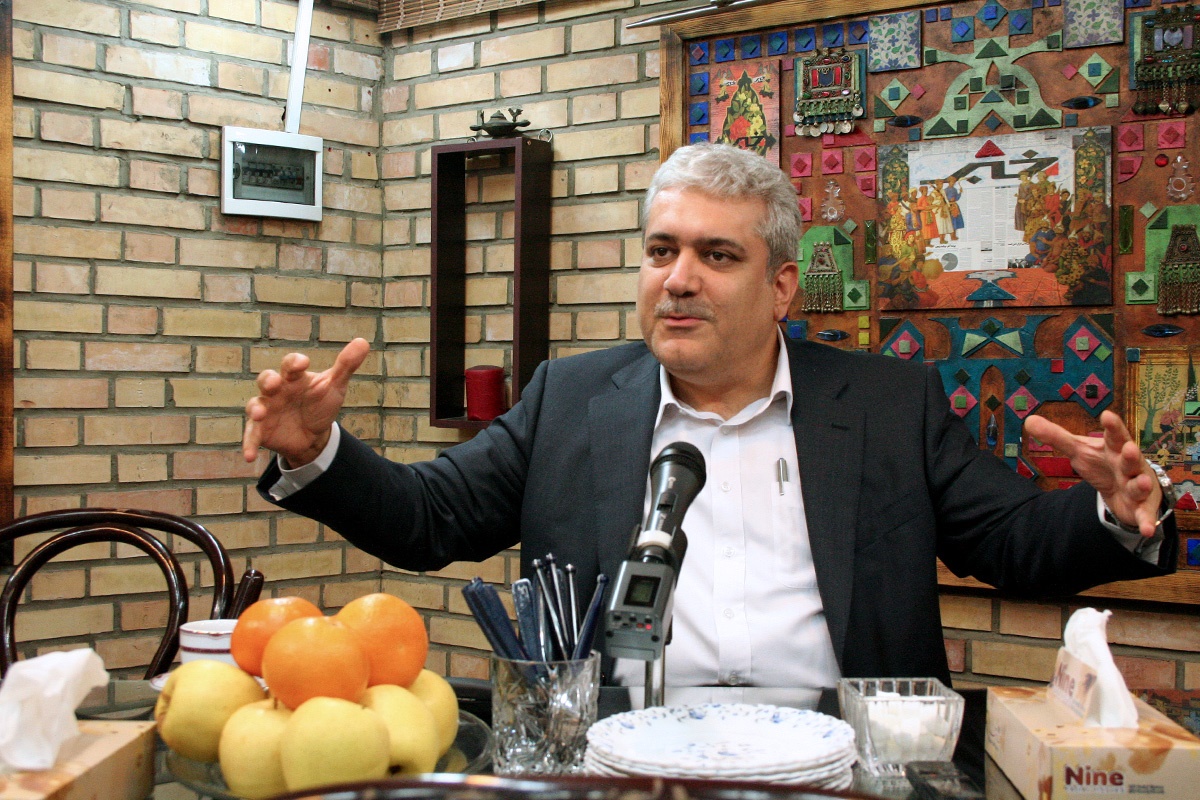
We had a bad experience in the previous government. Crisis occurred in the faculty of management and economy, which led to stopping the recruiting of PhD holders by the faculty. You just mentioned your lack of resistance and starting of growth until reaching this point. Today, we witness resistances by the government economy system, and we have mediators who are seriously being threatened. All of your ideas are based on modern Western economic systems, which are significantly resisted in the country. How do you plan to inhibit them?
I think that this problem has been already solved. Currently, the government management has come to the conclusion that if it wants to resist against this individuals, it must allow the entrance of foreigners into the country. I said this in the banking conference. If you prevent the work of Digikala, Amazon will enter the country. If you resist against Aparat, it will be replaced by Youtube. The same applies for Bazar app. Telegram is the result of our lack of competence. It is not fair to have a popular foreign app in the country but its similar domestic counterparts face many obstacles in the country. This was discussed during the cyberspace higher council a long time ago. A directive was approved by the judiciary system to facilitate legal interactions in this regard. The Vice-Presidency for science and technology affairs is the custodian of knowledge-based companies, and each government organization that wants to interact with them must go through us. It does not matter if the government organization is the tax office or ministry of information. Being the custodians of these companies means supporting their knowledge-based businesses. Despite our constant attempts at eliminating the cumbersome laws for the new economic system, we are still not successful in this area. We have dedicated extensive efforts to creating a new model in the startup environment, where the private sector can be active and there is not government rent. I always say to the startup employees that when they fight against you and suppress you, that is when you win. This shows your success. The same behaviors have been observed toward many businesses. I never forget that in 2016, the managers of Tap30 and Snap referred to the Taxi Management Organization, they were treated disrespectfully and were eventually thrown out. They said that they do not have the necessary licenses and their app can be used by the taxi organization itself. Today, Snap is worth one billion dollars in just two years. I seriously enjoy when see that so many intelligent individuals are working in Tap30. The same occurred to Bazar and Divar apps. Everyone wanted to destroy Divar. Now, Divar is the first website in Afghanistan and the sixth or seventh in Iran. Before Nowruz, some people attacked the insurance employees, which means accepting defeat. After that, it depends on the people themselves not to surrender and continue their activities until reaching success. However, I assure you that we will support them.
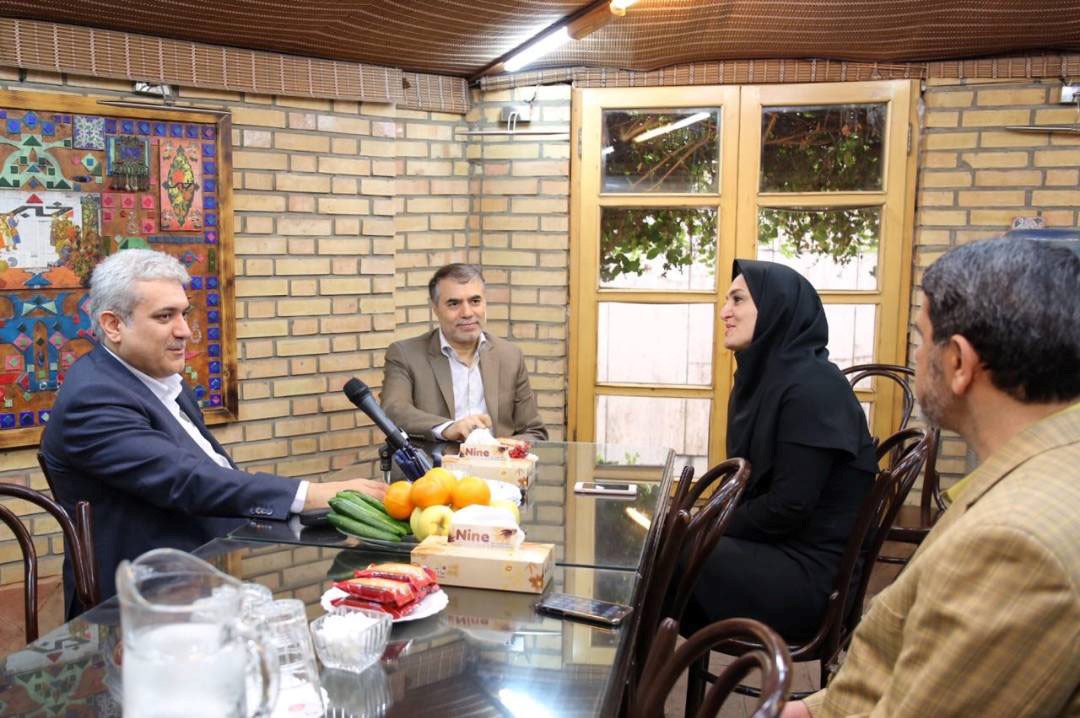
You provided statistics on elites attraction. There are two sides to this aspect. Some of them are still outside the country and some are returning. When will the algebraic aggregation of this process of migration and returns come to the turning point?
We have a general discussion in the area of migration. The current statistics on this issue are lie and not reliable at all. Yes, we do have the issue of brain drain and emigration of elites but it is not as bad as they tried to portray. About one percent of our students are studying abroad. However, the normal international figure in this regard is three percent. It means that the rate of emigration in Iran is lower than the global rate. In 1979 (the beginning of Islamic revolution) we were ranked first in terms of emigration of students in America. Today, we are ranked 12th owing to the presence of 12 thousand students in America. In this respect, the Saudi Arabia has five times more students abroad and Korea has eight times more students. China has more than 300 thousand students in America. This phenomenon must become a political issue. Over this time, I tried to return elites from the outside of the country while not involving them in political controversies. I think that my most important achievement in the past three or four years has been separation of technological areas from politics. Political groups tend to use this area as a tool. Regarding the issue of brain drain, I dedicated extensive efforts to separation of politics from this concept. The fact that the share of young people with high education is high in the statistics of emigration of the country is a negative point. However, this rate is not that high. For instance, the peak of emigration of Iranians to Canada was about 16,000 a year, which has reduced to 5,900. This is also observed in America. We generally send emigrants to three countries, America, Canada, and Australia. All of the Europe has a rank equal to one of these companies and the rate of emigration is not that high in other countries. According to our international statistics, we have had 135 thousand emigrants during five years (2010-2015). By referring to official websites of Canada you can see that this country accepts about 250-300 thousand emigrants a year, six thousands of whom are Iranian. The same applies to America. I believe that we have about 360 thousand Iranians in America, which is significantly low, compared to the other countries. Nevertheless, the high rate of elites in these statistics is concerning. No one rejects brain drain in Iran but it is not an odd phenomenon. Our neighboring countries have higher emigration rates. However, this has become a political issue, which must had been prevented. We need to lay the necessary groundwork in our economy for returning our children to the country, which is not possible through government money.
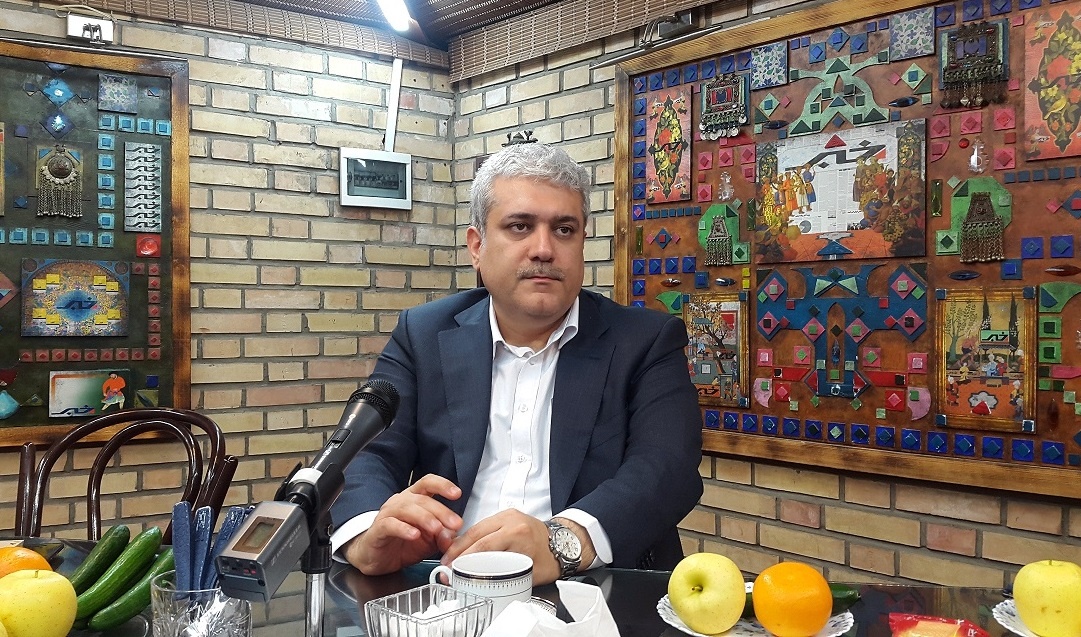
How can we make large industrial companies and specifically government enterprises knowledge-based?
From a legal perspective, these companies must be private or the share of private section is above 50%. Until government companies do not compete with startups, they will not seek investors in these companies. The traditional section must realize this issue and understand that instead of standing against the youth, we must invest in them. We all know that these are the actual winners and the traditional system cannot compete with them.
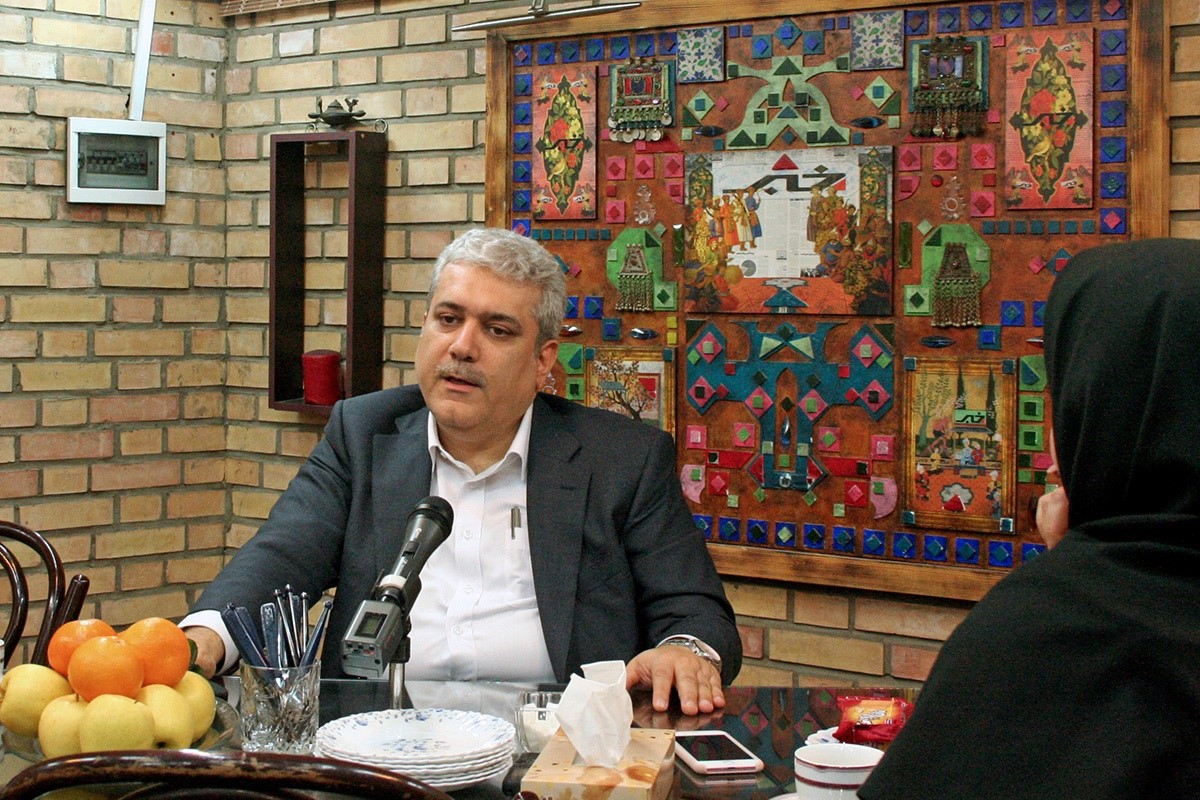
Now that we reached this part, let’s talk about domestic production. We are not brought up with the concept of complete and accurate working to provide a high-quality product. What can we do to improve the domestic production quality and avoid failure in this regard?
Unfortunately, the automotive production issue has been so bad that everything is compared to this area. We have supported this industry so much that it cannot be taken back today. We also have ideas for this part of industry. Today, the automotive section has undergone several changes. How does a technology system work? For instance, in the 1990s when cellphones came to the market, we had a series of large cellphones and brands such as Nokia were active. Where was apple? What happened that Apple reached its current situation after 10 years? Apple did not produce just a phone but created a friend for people, who are not willing to be separated from this friend for even two minutes. The concept of iPhone was not to have just a phone. The same is happening in the automotive section. The concept of electric cars was unknown to many automobile manufacturers in the world, and nobody paid attention to it until Tesla manufactured its automotive. Tesla was not an automotive production company. After that, everyone realized that this section is changing and we must move toward this pass. Just be ready for Google to produce its own car and transform the industry. In the future, there will be companies that will definitely print the automotive parts. Today, automotive manufacturers might think that these will not happen in the future, but there will be a day that startups compete with them. They will realize that they cannot modify themselves in the market. Nevertheless, in the knowledge-based product area, we do not have support policies from the government similar to the traditional sections. That is why the export of knowledge-based companies reached 450 million dollars last year. While this figure is still low, we started from the bottom. This year, we have predicted the revenue of above 800 million dollars in export rate of high-tech companies. Sales rate of our nano companies has now reached 1100 billion IRT. Meanwhile, this figure was zero four years ago. In this area, products are exported to China and Korea. It is hard to believe but we currently export nano spinning machines to China. Who could believe that we would be able to compete with China in this area, especially in their own land? This is mainly because the relevant countries were not supported through false traditional methods and they took up their own mechanisms to grow.
During the preparation of the 2020 vision plan, one of the expert economists, who was involved in the process, stated that one of the mistakes in preparing the document was lack of considering the progress of other countries. For example, take Saudi Arabia that has established the Malek Abdollah University in MIT form and its statistical performance is on the rise by injecting oil assets. There is a growing emigration of students to this country as well. How do we compete with them?
I do not take the neighboring countries serious. On my first day of work, I ordered a research to be conducted by the best Iranians working in the Silicon Valley. The topic was that why this place is located in California and not in other parts of the world, such as Dubai, New York, and Paris? There was planning on creating media and internet city in Dubai. So why not something like Silicon Valley? The answer was one word: ecosystem. We need to have a proper ecosystem. An ecosystem means having an environment which is filled by talented individuals and not those with wealthy families. This system must not be managed by wealthy individuals. Take Facebook into account. The idea of social network existed before this media as well. However, Zuckerberg who went to Harvard and dropped out was able to create this media. He had a rough childhood. The same applies to Steve Jobs and Bill Gates. We do have similar individuals in Iran, such as Mohammadi in Digikala, Armandahi in Café Bazar, Hamedifar in CinnaGen, and others. These people are extraordinary. This system must grow from the inside. People with oil-based attitude think that everything can be bought. But this is not what is happening in the economy. This approach is also applied in Saudi Arabia. While their university has received four billion dollars for budget, I ensure you that they could not compete with Sharif University of Industry even if they had 40 billion dollars. Money does not buy knowledge and produce technology. For many years, we have insisted on buying technology in our foreign contracts. However, we did not realize that technology cannot be bought and must be learned. We need to have an appropriate ecosystem. Our neighboring countries also lack this ecosystem. Nevertheless, the east of Asia has been transformed owing to the implementation of this ecosystem. There is a greater number of Saudi Arabic students in North America Universities, compared to Iran. However, the difference between these individuals is that 56% of our students have received full funds from the American universities but the Arabs study in this country with their own money. That does not work and will not lead to technology production. This process can only be carried out from the inside. Meeting of Ben Salman with Zuckerberg and visiting the Silicon Valley will not lead to the formation of a new Facebook in Saudi Arabia. You need to have someone like Zuckerberg in your own ecosystem, who have started its work from the bottom. This cannot be spontaneously generated. The authorities of Dubai visited the Silicon Valley and saw that there are a number of buildings and laboratories. They decided to build something similar but they did not realize the presence of hard-working staff in these places. Those brought up in wealthy families cannot be successful in startup environment.
I want to ask a question about science policy making. Right now, we have hundreds of graduates in the field of science and technology policymaking, who are not used in any area. Our universities are not linked to the industry and their articles are not in line with domestic production. All of these are related to the policymaking of science. Even the tables of the macro science plan of the country were empty when the document was published. What is the main cause of this problem?
The problem in the area of industry and university is that none of them has come from the heart of the society and they have always been forced on us. In the past, there was no such thing as a university. So how come we have Abu Sina, Ibn Haytham, and Farabi? How come we cannot have similar scholars today? We have universities in all parts of the country, for which we have paid a lot. This problem is due to the fact that the phenomenon of university has not been born from inside the community. In Iran, people took an idea from the west (mostly France) with good intentions to create universities and teach a number of disciplines. There is an industry in Iran called carpet industry, which is still active and exports products despite many problems in this area. What benefits have universities had for the industry of crafts and carpets? What have we done for those who have dedicated their whole life to this industry? Meanwhile, when we talk about export, we are proud to explain about our crafts and carpets regardless of lack of university services for these industries. The condition of our industries are the same. In Isfahan, we dedicated extensive efforts to establishing the industry of metal, cement, refinery systems and power plants. Nevertheless, Isfahan has been ranked third in the country in terms of unemployment of its residents. They are now faced with water depression and air pollution because of this act. However, Isfahan is a cultural city and can affect the global culture by its capabilities. So why did we do what we did? This is because a non-domestic industry and university have been used with non-domestic ideas. Then we ask why they do not match? Because there is no similarity. This is happening in the country for the first time. There are more than 400 companies around Sharif University of Industry today. In addition, new companies are established every week and not all of them are students of this university. A special zone is being created in this place. The same happened with the existence of Silicon Valley around Stanford University. We have established an industry that has come from the university and society. The startup companies emerging from the heart of the society are being mocked by others but they will affect our culture and industry.
Do you think it is better to establish universities with startup system or use the same traditional methods that direct the universities toward this path?
All industries and investors are moving toward this direction. The whole society must move toward this path since they are our children. In fact, knowledge-based is a group of youth whose asset is their brain. You must invest on their mind and brain and not equipment and niches. However, there is a long way to go. Take whatsapp for example. When Facebook bought it at 21 billion dollars, there were 48 individuals working in this company and their workplace was rented and it has only been a few years of their activities. How such pricing occurred? We are talking about this type of ecosystem. I am happy that after three-four years, everyone is talking about it. At first, no one would pay attention to this issue but today, everyone can feel its effect on the society and reversing the brain drain process and elite attraction. This is a new ecosystem, and these companies will be turned into the largest companies of the country in the next two-three years. The media must introduce this system and identify the Iranian counterparts in addition to informing about the successful global entrepreneurs. For instance, I visited the Café Bazar before Nowruz and realized that it has more than four million users and its founder is a great entrepreneur. They have even recruited 53 Olympiad winners. Today, hundreds of individuals with PhD are working in these companies. Would they be this much influential if they were working in the government section? We do not model the entrepreneurial startup activists. When I traveled to China, Philip Yeo had come to the city from Alibaba for a lecture, which led to a massive traffic in the city. Millions of people came to listen to his speech. We have similar influencers in the country. Digikala sells 13 billion IRT worth of products every day. All Arabs gathered together and established Souq but it only has one-fifth of the sales rate. Something that is odd and strange for all people is the existence of a proper startup environment in the country. Iran was described as the “Republic of Startups” in the latest article of Financial Times.
Are these startups related to the support of Iranian products?
Yes, startups are completely Iranian. Some of my friends say that they sell foreign products but they do not see that if they were not here, a foreigner would come and sell the products. The nature of our startups is Iranian products whether in the area of service or technology. There is no end to the activities of these startups. There is always competitions and new startups are formed every day. In addition, technology startups produce and export Iranian products. An Iranian company such as Cinnagen has a domestic sales rate of 1000 billion IRT every year and is recognized as one of the important factor for the rational cost of advanced medications in the country. Iranian products include various services as well.
How is your economic targeting until the end of this government?
I cannot elaborate on that. Discussions have been held and numbers have been suggested but I cannot provide a definitive answer. The total sale of these companies was 60 billion IRT last year. The only thing I can do is to provide a business environment for our children. Many people await the new system, and some of these companies will enter the stock exchange market this year and their worth will somehow determined.
Another question asked in this regard is somehow a criticism. They say that the weakest international area among the executive organizations is related to your Vice-Presidency. Why knowledge-based companies and centers play no role in debates on economic diplomacy and economic cooperation, similar to chamber of commerce and investors?
We think about this issue in another way. Last year, export of knowledge-based companies was about 450 billion dollars. We created an export corridor where facilities are provided to companies in order to sell their products and services. A part of this corridor is educational and is allocated to patent registration and standards. These are new in the country. We registered drugs for the first time. Five drugs were registered in Russia and some others are passing the registration path in Europe, which will have huge sales in the future. It is the first time that we are faced with the topic of license issuance for clinical trials. We teach these things in the export corridor. Today, we have created export headquarters in more than 30 countries without paying salaries or being affiliated to the Vice-Presidency for science and technology affairs. All of these centers work because of our spiritual support. They definitely have their own problems but what I mean is that the export of these companies is significantly different from the traditional form of export. They have various marketing methods and types.
It seems that you are introducing a new model and many of these criticisms are due to lack of knowledge about this model and comparing it with the traditional model. Another question is that what is the difference between you and the ministry of science, research and technology?
In the past, the Vice-Presidency has similar duties as the ministry of science. It was like this when I was appointed as the head of the Vice-Presidency. Today, everyone knows that we do other things as well. For instance, in the area of technology parks, they attain their licenses from the ministry of health or science. We want to move toward the direction that all of Tehran be turned into a technology park. I hope that our project will be completed with the cooperation of the municipality of Tehran. This park does not just have a physical concept but it also has a virtual concept. Ecosystem is important. If work environment is prepared, physical space has no meaning anymore. Everyone can be entrepreneurs even from their house. We have serious concepts on this issue. There are so many intelligent and energetic youth in the country who are ready to work. This does not mean that we pay no attention to border-knowledge research. I did not talk about this issue that much today but we are the largest supporter of these projects. However, other areas need help as well, such as various funds or the national elites foundation, which covers more than 4000 thousand individuals every year. However, we still have not reached our ideal place in the area of elites foundation. All of these are challenges and every country in the world are dealing with them. How can we enter elites into the government system of the country? This is a challenge for which we have a plan in the foundation. However, no one has been found with the ability to perform this task and train experts for middle management of the government. However, the main issue is that none of the plans will be successful until there is a proper ecosystem and a market to present this knowledge. Little can be contributed to the border knowledge area as well. Border knowledge is the sphere of authority of a state and a nation, which must be invested in. However, today, everything has changed in a way that the Americans have allocated the space to the private sector. In one of my travels to America, I met with the former CEO of Google (Eric Schmidt). Two months after that meeting, Schmidt became the US defense advisor to enter the google technologies into the defense system. Until yesterday, Americans would defend these costs since they believed that they were protecting the knowledge border. Then, the private sector extracted products (e.g., washing machine) from their technologies. Everything has been reversed in the Silicon Valley. The private sector has invested in this section so much that the government asks them for things that have defensive aspects. Now, imagine that how far is the Saudi Arabia from this type of thinking? How far are we from this thinking style? We have an oil-based government system and everything here depends on oil. The moment we are separated from oil, we are on the right path. Then we would realize that we need to work and dedicate extensive efforts to this area. Nothing will happen as long as we depend on the government or paternal money.
Could you please explain about the “Made in Iran” festival?
This festival has been designed and implemented by the knowledge-based economy and culture building development headquarter and its second round will be held this year. This festival is important in culture building. There are six objectives in “Made in Iran” festival, as follows:
1. Cultural mainstreaming for knowledge-based economy to help realize the slogan of support of Iranian products
2. Culture building to support Iranian products and increase occupations for human assets of the country
3. Prevention of excessive import of products with high-quality domestic counterparts
4. Mainstreaming for flourishing of the ecosystem of entrepreneurship and innovation with an occupation creation approach
5. Culture building, promotion and publication of the produced works in the cyberspace, media and IRIB with the help of art and culture activists
6. Helping the branding and commercialization of high-quality Iranian products
It is not our intension to go to the festival and just buy Iranian products. In Made in Iran festival, we have the issue of culture building; mainstreaming and content production in support of Iranian products and using the power of artists in this regard. About 70-75% of the Iranian people are familiarized with the cyberspace. However, content production in the cyberspace does not match the Iranian culture and knowledge. Therefore, holding this festival and creating links between knowledge-based economy and producers and activists are carried out to eliminate the carries in the cultural mainstreaming, which will result in content production on the media. The first round of the festival was successful and changed the attitude of people to some extent. In my opinion, we significantly need these festivals especially now that we need to internationally support our children. The made in Iran festival is held in line with content production to support Iranian products and its goal is to familiarize artists and the art society with the topic of knowledge-based economy and use of the language of art for cultural mainstreaming in this area.
Source: Khabar Online



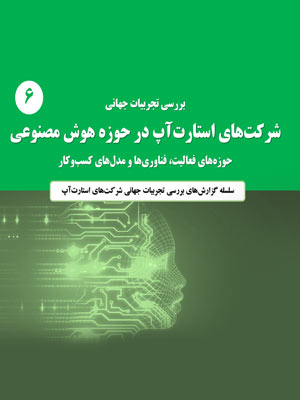



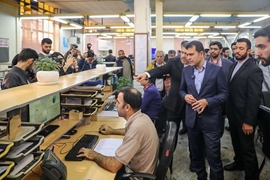
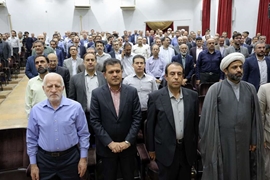
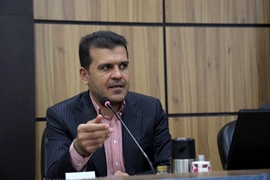
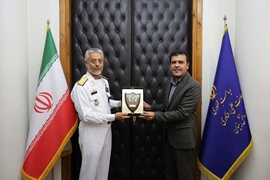


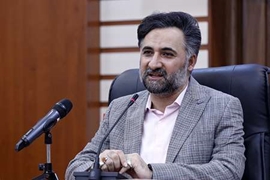
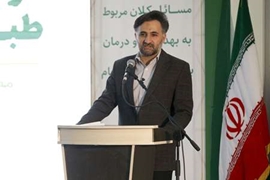
comment